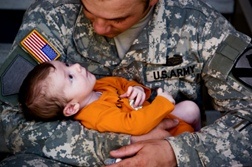LAWSUITS NEWS & LEGAL INFORMATION
Veterans PTSD (Post Traumatic Stress Disorder)
About 20 percent of war veterans coming back from Iraq and Afghanistan experience some degree of veterans PTSD (Post Traumatic Stress Disorder) as a result of having been witness to, or directly impacted by, attack, ambush, serious injury or death. PTSD is also referred to as "shell shock" or "combat fatigue". Many post traumatic stress disorder veterans who were denied PTSD veteran disability benefits are now having their claims re-evaluated, in response to a recent VA PTSD class action lawsuit filed by combat veterans.
FREE VETERANS PTSD LAWSUIT EVALUATION
Send your Veterans PTSD claim to a lawyer who will review your claim at NO COST or obligation.
GET LEGAL HELP NOW
GET LEGAL HELP NOW
About Veterans PTSD
 PTSD symptoms include flashbacks, vivid nightmares, intrusive thoughts, exaggerated startle response, emotional numbness and more. PTSD is recognized as debilitating: information for PTSD treatment can be found online at the National Center for PTSD.
PTSD symptoms include flashbacks, vivid nightmares, intrusive thoughts, exaggerated startle response, emotional numbness and more. PTSD is recognized as debilitating: information for PTSD treatment can be found online at the National Center for PTSD.
In 2008, a study by the Rand Corp. estimated that 300,000 veterans of the current wars were suffering from PTSD or major depression. According to the VA, however, as of Fiscal Year 2009, nearly 390,000 veterans were receiving ptsd veteran disability benefits, making it the fourth-most prevalent service-connected disability.
According to a government report, more than 134,000 veterans of about 1.6 million troops who served in the war zones of Afghanistan and Iraq were seen at VA health care facilities for "potential PTSD" as of late 2009. It is not known how many veterans received treatment for PTSD. Researchers at the Naval Postgraduate School and Stanford University estimate that the PTSD Iraq War veterans will be about 35 percent.
Do you Qualify for VA PTSD Disability Benefits?
 The following disability types will help determine whether you qualify for VA disability benefits:
The following disability types will help determine whether you qualify for VA disability benefits:
Direct Service Connection means your disability was diagnosed during the time you were serving and continues to negatively affect you today.
Presumptive Service Connection means the VA predetermines that your disability is connected to your "time," "place," and "type" of military service.
Aggravation Service Connection requires evidence that your condition existed prior to your military service and has worsened as a result of service.
Secondary Service Connection requires evidence to the VA that your disability or injury is the result of another service-connected disability or injury. It's possible to obtain this rating by proving that a service-connected condition caused a new disability, or made a pre-existing or non-service connected disability worse.
Injured as a result of VA medical treatment occurs due to poor treatment at a VA hospital. These benefits may also be granted to veterans who have an existing injury that was aggravated due to medical malpractice at a VA hospital.
PTSD and Risperdal Study
PTSD and Psychogenic Non-Epileptic Seizure
The study also showed that veterans who were diagnosed with psychogenic non-epileptic seizures were diagnosed on average five years after the onset of symptoms; for civilians diagnosed with the condition, diagnosis only took an average one year. For roughly 60 percent of the veterans included in the study, their seizures were attributed to traumatic brain injury (TBI).
Of note, according to Dr. Salinsky, many of the veterans in the study who were ultimately diagnosed with psychogenic non-epileptic seizures were prescribed epilepsy drugs prior to being given their proper diagnosis. This, he states, may cause serious, unwanted side effects and also will not help with psychogenic non-epileptic seizures.
VA PTSD Disability Claims Re-Evaluated
 Recent events, however, will streamline this process and secure PTSD veteran disability benefits.
Recent events, however, will streamline this process and secure PTSD veteran disability benefits.
Veterans can now hire attorneys to represent them for benefits before the Veterans Administration. Prior to this recent legislation, attorneys have been prohibited from charging a fee to represent veterans at the administrative level.
In December 2008 a class-action suit, Sabo v. United States, was filed in the U.S. Court of Federal Claims by seven veterans who suffer from PTSD but who were denied a required rating to make them eligible for a variety of long-term benefits. The lawsuit claims that between December 2002 and October 2008, the military illegally denied benefits to an entire class of service members who returned from Iraq and Afghanistan with PTSD and were discharged from service.
One year later, a federal judge in Washington accepted a list of about 4,300 veterans who may also have been improperly denied PTSD benefits.
 The court's notice invites veterans to join a class action lawsuit filed in December 2008 in the U.S. Court of Federal Claims by signing and submitting an "opt-in" form no later than July 24, 2010.
The court's notice invites veterans to join a class action lawsuit filed in December 2008 in the U.S. Court of Federal Claims by signing and submitting an "opt-in" form no later than July 24, 2010.
The disability ratings which are the subject of the lawsuit are extremely important to veterans with PTSD. A permanent disability rating of 30 percent or more entitles a veteran to monthly disability benefits for the rest of the veteran's life, to free health care for the veteran and his or her spouse for life, and to free health care for their minor children. (In previous years, a disability rating of 50 percent was required to receive disability benefits.) Because the ratings are increased, class members may be entitled to back pay of disability benefits, reimbursement for health care expenses the military should have covered, and future benefits.
Legislation was recently introduced to streamline the "broken" VA claims process, especially for veterans in traditionally non-combat roles. In the past, the VA required independent proof that a traumatizing event--also known as a "stressor--occurred. Under the proposed changes, a veteran's "lay testimony" about what happened to him is sufficient, as long as it "is related to the veteran's fear of hostile military or terrorist activity" and is "consistent with the places, types, and circumstances of the veteran's service."
As of January 2010, the Disability Evaluation System program will expand to thirty-three installations. (Currently, there are twenty-seven military facilities that take part in the program.) The six new installations will include: Fort Benning, GA.; Fort Bragg, NC.; Fort Hood, TX; Fort Lewis, WA.; Fort Riley, KS.; and Portsmouth Naval Medical Center, VA. If a disabled veteran does not use this program at one of the above facilities, their evaluation will be reviewed by the Defense Department physicians, then by the VA—a long and complicated process. The Disability Evaluation Systems program allows veterans to undergo just one medical exam and obtain a single-sourced disability rating—and receive VA disability benefit payments without a long wait.
Other Veteran Psychological Disorders
- "When a mental disorder that develops in service as the result of a stressful event is severe enough to bring about the veteran's release from active military service, the rating agency shall assign an evaluation of not less than 50% and schedule an examination within a six month period following the veteran's discharge to determine whether a change in evaluation is warranted".
Veterans PTSD Legal Help
If you or a loved one has suffered damages in this health care case, please click the link below to send your complaint to a lawyer to evaluate your claim at no cost or obligation.Last updated on
VETERANS PTSD LEGAL ARTICLES AND INTERVIEWS
VA Benefits Ultimately Failed One Young Veteran

“They Set Me on Fire”

Veterans PTSD Is On the Rise, New Programs to Help


March 9, 2015
There is a widely held view that VA benefits are hard to come by due to the number of VA members applying and qualifying for benefits coupled with a backlog of cases and a lack of resources to properly deal with all the cases in a timely manner. Others hold the view that a culture of systematically denying VA disability benefits on the first application leads to an appeals process and delays that mirror a culture widely seen in the insurance industry. READ MORE
“They Set Me on Fire”

August 31, 2013
American military vet Steven Anthony was already living a life compromised by Post Traumatic Stress Disorder (PTSD) when he was suffered another blow to his already fragile mind at a Veteran’s hospital in Martinsburg, Virginia. Steven became a victim of veteran medical malpractice. READ MORE
Veterans PTSD Is On the Rise, New Programs to Help

April 12, 2011
A program aimed at combating Veterans PTSD in New Jersey will not only help those who return from harm's way, but help in continuing to spread the word that post traumatic stress disorder veterans are out there and increasing in number, as recent reports suggest. READ MORE
READ MORE Insurance Settlements and Legal News
READ MORE Malpractice Settlements and Legal News
READ MORE Personal Injury Settlements and Legal News
READ MORE Malpractice Settlements and Legal News
READ MORE Personal Injury Settlements and Legal News

READER COMMENTS
Bradley Steinberg
on
With PTSD
TBI
NO HELP FOR
Fotuoatua Faalata
on
Shirley Thompson
on
"Under a new regulation, mental conditions other than PTSD, such as an adjustment disorder or depression, are being re-evaluated. A number of veterans may want to check their ratings to determine whether they were properly awarded benefits. The Code of Federal Regulations (38 CFR § 4.129) states that: "When a mental disorder that develops in service as the result of a stressful event is severe enough to bring about the veteran's release from active military service, the rating agency shall assign an evaluation of not less than 50% and schedule an examination within a six month period following the veteran's discharge to determine whether a change in evaluation is warranted".
If this regulation was improperly applied to you, contact the VA Department Service Officer or an experienced VA disability attorney, who can determine the best course of action and possibly have your claim re-evaluated."
Joseph Brown
on
Anonymous
on
California
on
Texas
on
Oregon
on
Oklahoma
on
Florida
on
They know I have PTSD real bad, and have not prescribed me any medicine! Please call and we can go over the whole medical file- I have copies of all. I am not collecting disability either. I have applied many times,